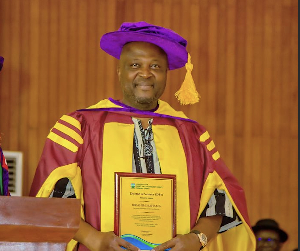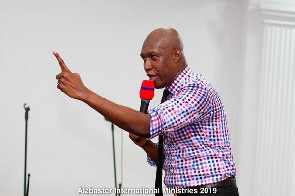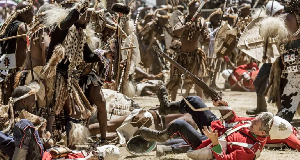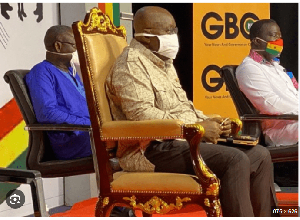The 38th Gonjaland Youth Congress will be taking place in Daboya from 17th to 20th April 2014 and one can feel the excitement amongst the youth of Gonjaland as they prepare to converge in Wasipe (Daboya) for the three day congress. Members of the Association including well-wishers and invited guests will be travelling from every corner of the country and some from the diaspora to this ancient and historic Gonja town to participate and grace the congress. Since this year’s Congress is taking place in Daboya, Gonjaland Association UK and Ireland branch believe it will be useful to explore a bit of its history, the people and their aspirations.
Daboya is located in the northwest of Tamale approximately 67 Kilometres from Tamale, the capital of the northern Region and the population is predominantly Gonja however, Tampluma and Hanga’a is also widely spoken.
Daboya was formerly known as ‘Burugu’ which means a water well or simply a well in both the Tampluma and Dagomba languages. It was one of very few places the inhabitants of the area could get good drinking water in the olden days.
After the conquest of the Tampluma people on the Western banks of the White Volta River, Ndewura Jakpa placed the land under the authority of his daughter. She was known as ‘Buruwuche’ (Burugu-wuche or chief of Burugu). The indigenous owners of the land though were the Tampluma people and their Chief was called Janbologuwura.
Legend has it that one day a leper visited the town and as tradition demands was taken to Buruwuche, who then referred the visitor to the Jangbologuwura. The leper was well received and properly taken care of by both Buruwuche and the Jangbologuwura. The leper who is said to possess supernatural powers was very pleased with the reception he received. So much so that before departing the town he asked his host to show him a place where grass does not grow. He was taken to one such location where he dug a small well and performed some rituals. He then gave some instructions to the effect that when it rains the well will be filled with salt water and from then on, salt shall become available to the people of the land all the days of their life. He also predicted that the stream in the town shall expand to become a river. His predictions came to pass and salt became abundantly available to the inhabitants and the stream expanded to become the river we know today. However, the Dagombas around the area also took interest in the salt and will either come around to steal some or harass the people for salt.
Following persistent harassment by the Dagombas and fearing defeat in the event of a full blown war, the Jangbologuwura advised ‘Buruwuche’ to solicit help from her father. On her visit to seek help, she took along some salt and fish as presents to the Yagbonwura who gave some to her siblings. They were very surprised and exclaimed in Gonja ‘Nda peye bo Anye ye” which literally means our elder’s land is better than our’s. This has since been shortened to ‘Daboya’.
In the meantime, help came from her brother, Denyan, the Chief of Wasipe. Denyan was the third child of Ndewura Jakpa and the twin brother of the first Kpembewura. Hence tradition has it that to this day, in any assembly of Gonja chiefs, the Kpembewura and the Wasipewura go together to pay their homage to the King of Gonjas –the Yagbonwura. They are followed by the other divisional chiefs in their order of seniority. This long-held tradition of the Wasipewura and the Kpembewura going together to pay their homage to the King is the symbolism of the umbilical cord which binds the two together as twins.
Wasipe itself is a small town located in the south of Bole. Denyan Wasipewura came to the aid of Jangbologuwura and his sister, the Buruwuche, with his warriors. With his help the Dagombas were defeated and driven away from the area. After the war Buruwuche requested that Denyan should stay as the Dagombas may come back again someday if they know he was not around and so a message was sent to their father who blessed the decision that the Wasipewura should remain in Daboya to provide protection.
Denyan settled in the Kawasi section of the town and his son settled at the Tarima section. The Wasipe family thus descended from Denyan the third son of Ndewura Jakpa and Daboya is the seat of the Wasipe division, one of the five gates that can assume the reigns of Yagbon or King of the Gonjas.
After defeating the Dagombas, the Jangbologuwura out of gratitude for what Denyan did for him, decided to honour him by giving him the tributes/royalties from the Daboya Market and has the privilege of enrobing/enskinning the Wasipewura to this day. The present Jangbologuwura is Mr Bakari Yahaya Gbandawura. He is a teacher at Yapei and so spends his time in Yapei and Daboya. He succeeded his father Bakari Sulemana Gbandawura and the present Wasipewura is Mumuni Abani Kabagsaya.
The vicissitudes of history described above, places in context the importance of Daboya in the socio-political life of Gonjas in particular and Northern Ghana in general. Its position as the central route for cattle traders travelling from Navrongo in the Upper East to Kintampo and the southern territories further raised its importance as a commercial hub of the North. Salt was an important and major item of exchange and used in the barter for slaves in the era of the unfortunate slave trade.
Talking about the slave trade brings memories of a very brave Wasipewura known as Kankrafu, who in 1910 organised a gun-powder plot to stop the Asantes from taking slaves from Daboya. He killed himself in the process with his sub-chiefs and all the Asantes who were sent there by the then Asantehene. Since then no further requests has ever been made by the Asantes for slaves from Wasipe.
Salt mining still goes on in the Daboya area today albeit in small quantities due to later discoveries in Ada and also due to salt importation from other countries. However, apart from salt extraction, the town is noted for its hand-woven and unique textiles. Daboya is known to produce the best smocks in Ghana. Additionally, the town is also known to have huge deposits of Barite a product used to make paints and several other products. The White Volta River runs by the town and offers a great deal of potential for boating, canoeing and fishing. The White Volta River rises north of Ouagadougou, in a lowland between two massifs, and flows generally southward for about 400 miles (640 km) through Daboya and Yapei to empty into the lake Volta, a large artificial reservoir created by the Volta River Project. The river was named by Portuguese gold traders in Ghana; it was their farthest extent of exploration before returning to their native country. The innumerable meanders along its course gave rise to the name Volta. (Volta is Portuguese for "twist" or "turn").
Relatively recently in 2012, the Electoral commission created a new constituency known as Daboya-Mankarigu out of the Damongo-Daboya constituency. Despite its rich history and potential natural resources, Daboya remains one of the poorest and most neglected towns in Ghana. One of the prominent reasons for the poor conditions and lack of development in that area is because the town and its surrounding villages are relatively inaccessible by road due to the river. While there are other alternative ways of reaching the area, they are not the most convenient. Daboya and its surrounding villages for this reason of inaccessibility has been nick-named ‘overseas’.
Realising the importance of the town in the socio-economic development of Ghana, the then Busia government in the 1960s made an effort to build a bridge over the White Volta in Daboya. The military adventurism which usurped power from the government 1972 meant that this all-important project was to be abandoned by the military government that took over. Till date, the remnants of the construction materials can still be seen along the banks of the river. No government after Busia has shown any interest in reviving the construction of the bridge despite the presence of a military training camp in the area.
Interestingly, the inaccessibility of the area has never been a stumbling to the determination of politicians during political party campaigns to win the votes of the poor inhabitants of the area. In other words, the people of this area have not been spared the deceit and con of our politicians who use the area’s inaccessibility to make promises they have no intentions of fulfilling. Sadly, these unscrupulous and greedy politicians seem to get away with their false promises because Ghana, like many other developing countries is bereft of political accountability.
Apart from the problems of accessibility to the area, Daboya and its surrounding villages is bedevilled with a number of other challenges. For example,according to a publication by the World Health Organisation the Daboya sub district had 54 villages in 1996 that were estimated to accommodate some 28, 714 people most of who live in traditional family compounds, surviving primarily by subsistence farming and fishing. The sub district is serviced by a single health clinic staffed by two medical assistants, a disease control officer and a midwife..
In the light of the innumerable challenges facing the Daboya area, the theme for this year’s congress couldn’t have been more appropriate: “Quality Education in Gonjaland; Prospects and Challenges”. Even early philosophers such as Aristotle and Plato have long underscored the importance of education as central to the moral fulfilment of individuals and the well-being of the society in which they live. In the past few decades, research has supported this conventional wisdom, revealing that education not only enables individuals to perform better in the labour market, but also helps to improve their overall health, promote active citizenship and contain to violence.
Quality education enables people to develop all of their attributes and skills to achieve their potential as human beings and members of society. In other words it is the very heart of both personal and community development. Daboya itself has only basic educational facilities and is without a secondary school so children in the area can only travel outside the town to continue their education at secondary level. They will usually travel to Tamale, Damongo or other parts of the country to do this and only if they are lucky enough to have family members who are willing to accommodate and assist them. For those without family connections outside the town it is always certainly the end of their education. Most often those who travel out of the town never return as they usually remain in these towns after their studies to look for jobs or progress to tertiary institutions.
Despite government’s efforts to widen access to tertiary education in the country there is no single university campus on Gonjaland. It is for this reason that the theme for the congress is not only right but well timed. It is hoped that by the end of the Congress delegates will be in a position to draw a road map for the provision of quality education in Gonjaland including a University campus, Polytechnics and possibly an increase in both Junior and Senior Secondary Schools.
The Gonjaland Association UK and Ireland branch having recognised the importance of education are already contemplating an action plan to get the government to establish a university campus on Gonjaland. Quality education is a human right and a public good and every government must ensure that quality education service is available freely to all citizens from early childhood and into adulthood. It provides the equity in society. Quality education does not only enlighten but it also empowers citizens and enables them to make proper and significant contributions to the social and economic development of their communities.
While wishing all the participants a very happy and successful congress, Gonjaland Association UK and Ireland will also implore members to reflect on the above issues and press for change!
Written by Gonjaland Association UK& Ireland.
Awudu Sannie (awudu2000@hotmail.com)
Solomon Tampuri (sal_solomon@hotmail.com)
Sheriff Adams (adamsheriff2008@gmail.com)
gonjalanduk@hotmail.co.uk
Opinions of Wednesday, 26 February 2014
Columnist: Gonjaland Association














